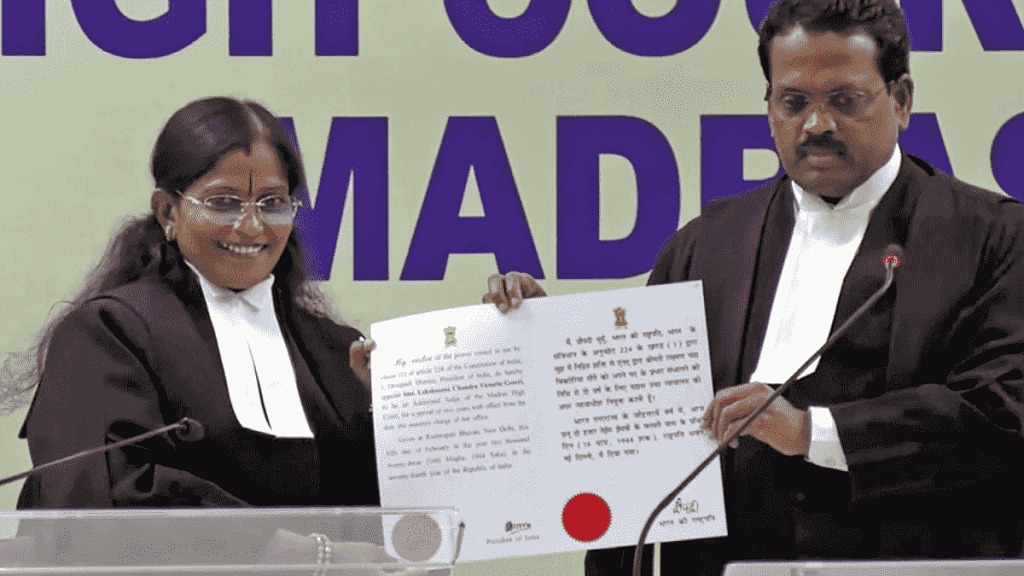The recent controversy over the appointment of advocate L Victoria Gowri as an additional judge of the Madras High Court has raised the question as to whether people with political allegiances should be made judges. Disclosure: The author led the team of lawyers who challenged Gowri’s appointment before the Supreme Court. The challenge was not because of her membership of a political party. It was on the ground that her publicly expressed views showing religious hatred were not in sync with the basic principles of the Constitution, thus making her “ineligible” for the appointment at the very threshold.
In fact, many people with past political associations have held high judicial positions over the years – both in the Supreme Court and in the high courts, often with distinction and occasionally without.
Supreme Court Judges, political affiliations
There are only two judges in the history of the Supreme Court who went to jail in the freedom movement. The first was Bachu Jagannadhadas who was a Supreme Court judge from 1953 to 1958. He was a member of the Congress party and was jailed during the Quit India Movement. The second was Justice Jeevan Lal Kapur who served in the Supreme Court from 1957 to 1962. He was a member of the Punjab Socialist Party and was jailed in 1930 in the Salt Satyagraha. Justice K.S. Hegde, one of the three judges superseded by Indira Gandhi in 1973 for the post of CJI, later revived his political career and became Speaker of the Lok Sabha. He too came to the Supreme Court with a political past. Nominated by the Congress party, Hegde served as a member of Rajya Sabha from 1952 to 1957. Soon after that, he became a judge of the Mysore High Court and then the first Chief Justice of the Delhi High Court when it was established in 1966. He was appointed to the Supreme Court in 1967 and resigned in April 1973 following his supersession.
Justice V.R. Krishna Iyer, who was a judge of the Supreme Court from 1973 to 1980, also had been an independent MLA supported by then undivided Communist Party of India (CPI). He also served as the Minister for Home, law, prison, electricity, irrigation, social welfare, and inland water from 1957 to 1959 in India’s first Communist government led by E.M.S. Namboodiripad.
Justice P.B. Sawant, in his lawyer days, was a member of the Peasants and Workers’ Party in Maharashtra. He later became a judge of the Bombay High Court and then of the Supreme Court from 1989 to 1995. Justice S. Ratnavel Pandian was the Tirunelveli district secretary of the Dravida Munnetra Kazhagam when he was a lawyer. He was appointed as a judge of the Madras High Court in 1974 and later served on the Supreme Court bench from 1988 to 1994. Justice Aftab Alam, a Supreme Court judge from 2007 to 2013, had been a member of the Communist Party of India till a few years before his first appointment at the Patna High Court. Justice V Gopala Gowda had been a member of the CPI(M). He later became a judge of the Karnataka High Court in 2007 and was on the Supreme Court bench from 2012 to 2016. Justice Baharul Islam, who was elected to the Rajya Sabha as a member of the Congress in 1962 and again in 1968, became a judge of the Assam and Nagaland High Court (now Gauhati High Court) in 1972 and was elevated to the Supreme Court in 1980. Controversially, he resigned from the top court in 1983 to again become a Rajya Sabha member of the Congress party.
Also read: From BJP leader & Hindutva activist to Madras HC judge — who is L Victoria Gowri
Chief Justices of high courts
Formidable names from the high courts also come to mind. Justice V. M. Tarkunde of the Bombay High Court (1957-1969) was closely associated with M.N. Roy (former Communist and radical Congressman and founder of the Radical Democratic Party which transformed into the Radical Humanist Movement). In fact, he was the general secretary of the Radical Democratic Party (RDP) from 1944 to 1948. Justice Rajindar Sachar who retired as Chief Justice of the Delhi High Court in 1985 (another one of Indira Gandhi’s “transferred” judges) had been a member of the Socialist Party. Justice M Rama Jois who retired as the Chief Justice of the Punjab and Haryana High Court in 1992 also had a post-retirement political career with the Bharatiya Janta Party. Even in his lawyer days, he was a member of both the RSS and the Bharatiya Jana Sangh before he was appointed a judge of the Karnataka High Court in 1977.
Judges from different ends of the political spectrum have brought to bear a different kind of sensitivity based on their political experience and this has enriched judicial discourse. Justice L Victoria Gowri’s political affiliation by itself does not make her ineligible, although the temporal proximity of that political association and her appointment would have been a factor in assessing her “suitability.” That was something subjective for the Collegium to take a view on, after getting whatever inputs it could and the Courts in exercise of judicial review could not have examined it.
Apart from her not being eligible for appointment because of her views, the other ground of challenge was that those views had not been brought to the notice of the Collegium by the Executive. This, the petitioners contended, had stymied the decision-making process of the Collegium, which had recommended her.
The author is a Senior Advocate at the Supreme Court of India.
(Edited by Ratan Priya)
